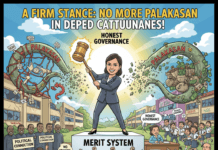Elbow room /Rapido Commentario | By Richard Santiago : In an era where social media dictates trends, the moral compass of many Filipinos seems to be plummeting, largely driven by the sensationalism of content creators who prioritize fame and followers over integrity and responsibility. For the sake of virality, some individuals resort to fake news, explicit content, and even crude humor, disregarding the impact on society, particularly on the youth.
One such controversial figure currently under public scrutiny is the rising content creator Jassie Tejada Batchiller. Known for her provocative and often offensive content, she has drawn flak from concerned citizens, including PD DOST Grace Molina, who called for an end to the glorification of such social media personalities. Molina, in particular, criticized the use of the term “Catanburaynon”—a vulgar reference to the female genitalia—repeatedly mentioned in Tejada’s videos. Instead of acknowledging the concern, the vlogger posted Molina’s comment, exposing her to backlash from her defenders.
While many followers initially found her content amusing, the repeated use of sexually explicit language and derogatory remarks against women have raised concerns. This is not just about free speech—it is about preserving respect, values, and the dignity of Filipino culture. When does entertainment cross the line into moral degradation?
The alarming trend of irresponsible content creation is a wake-up call for society. If we continue to tolerate and normalize vulgarity in the guise of entertainment, we are slowly eroding the fundamental values that define us as Filipinos.
We urge the Gender and Development (GAD) focal persons across government agencies to take a firm stand against content that degrades women and promotes indecency. It is time to act—not just by condemning these actions but by taking concrete steps, including:
* Filing formal complaints with Meta (Facebook) to demonetize and restrict offensive content creators.
* Enforcing existing cyber laws, such as cyberbullying and cyber libel, to protect individuals from online abuse.
* Educating the public on responsible social media use and the importance of upholding moral standards.
Our Constitution guarantees freedom of speech, but freedom is not absolute—it has limits and responsibilities. Abusing this right at the expense of public morality is a direct violation of the freedoms of others. We are not being hypocritical; we are advocating for a balance between free expression and ethical standards.
Social media remains unfiltered for minors, making it even more crucial for content creators to be responsible for their influence. With the power to shape opinions comes the duty to uphold integrity. We must reject content that degrades, misleads, and corrupts—because silence is complicity.
As responsible Filipinos, we must demand accountability. Our culture and values should not be sacrificed for the fleeting thrill of viral fame. Let us reclaim social media as a platform for meaningful discourse, creativity, and positivity—not one that glorifies indecency and disrespect. (Bicol Peryodiko Weekly)





















